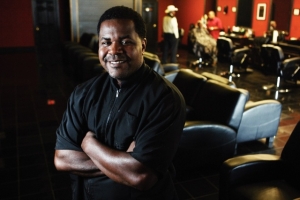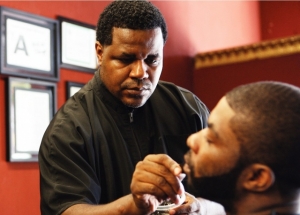Missed Direction: Mauricio 'Lobo' Howell
By John Joyce
Published in News on September 3, 2013 1:46 PM

News-Argus/CASEY MOZINGO
Mauricio "Lobo" Howell poses inside his barbershop, Premier Cuts, located in downtown Goldsboro. Opening the business was a plan formulated while Howell was serving a prison sentence for trafficking cocaine.

News-Argus/CASEY MOZINGO
Howell said he realized that a life of crime would only lead to disaster -- for both himself and his son -- but that it took getting locked up for him to turn his life around. Now he hopes to bring that message to young people -- before it is too late.
Mauricio "Lobo" Howell, 39, is on a new path.
This one includes his own barbershop, Premier Cuts, which he is opening on Center Street in downtown Goldsboro.
It is Phase 1 of a 10-year plan he has thought about and nurtured for 14 years, but was only able to begin to make a reality 4 years and 11 months ago -- when he stepped out of prison.
Premier Cuts is his new dream, his second chance.
And he is determined to make the most of that opportunity.
Lobo is a former inmate, released from federal prison after serving nearly two-thirds of a 20-year sentence for conspiracy to traffic cocaine.
He did the work to make it to this point -- paying his way through school, working hard, earning the respect of a community where he is known by virtually everyone -- young and old, black and white, lawman and outlaw.
He has earned their trust, he says, not because of his back story or in spite of it.
The reason, he says, is character. He is not the man who left for prison.
And now he is determined to give back to those who might be at the same crossroads in their lives he was once at -- and to stop them, if he can, before they make the same mistake.
*
Howell, a Goldsboro native, does not deny his crimes, nor does he make excuses.
Instead, he reflects on what took him down the wrong path.
He remembers what it took to survive.
It is knowledge he will use as he takes on a new role -- as a role model, a businessman, a community leader.
"My early childhood, I had a good upbringing -- my mom, my dad," he said.
His father was in and out of jail, however, and when Howell was in eighth grade, his dad went away for his first long stretch.
"That changed things for me dramatically," he said.
Until then, Howell, who initially lived in Lincoln Homes with his mother and brothers, had been living with his father and starting for his school's junior varsity basketball team -- point guard, the on-court leader of the team.
But after his father went away, Howell moved back to what he calls "the jungle."
His family, like most in Lincoln, was very poor, and at times had no money for food.
So Howell started selling drugs to fill that need.
He continued because of the lure.
"The money, when you start looking at that, it blinds you," he said. "You don't think about it coming in, but once you start buying this and that, different things ... It's the money."
Howell got "heavier in the game" and was going strong until, at 18 years old, his life changed when he had a son of his own.
"I started realizing, I ain't trying to keep doing this. I'm getting older, got a son," he said. "But once I realized this wasn't for me and started trying to get out of it, that's when it all came crashing down."
At 20 years old, Howell was sentenced to 20 years.
It was a federal court and a federal judge.
And that meant federal prison, a place far different from the Wayne County Jail or even state prison, Howell said.
It was dangerous.
He served time in Kentucky, Durham, Alabama, Atlanta and finally South Carolina.
"Kentucky, the prison looked more like a college campus -- nice landscaping, like a little city, a store, movies, concerts. It's a lot different."
Atlanta, though, was no college campus.
Howell called it "Gladiator School."
"It's rough," he said. "They got so much in Atlanta going on, killing, stabbing, fights inside the jail."
He survived prison by getting a job as a barber -- the trade he had been preparing to do something with once he got out.
Barber college was part of his plan for getting out of the street life.
After he completed his training, he practiced his craft.
At each prison he went to, he was sought out to cut hair, to the point where he became the top barber in each jail.
He learned a business secret there -- business, and success, are about relationships and respect.
"Sometimes it didn't mean I was the better barber, but it matters in the way you treat people," he said.
His chair was open to anyone. It was the experience he sought -- and he learned a lot about handling people and building a clientele.
"You're dealing with different attitudes, different people -- murderers, killers, ex-drug dealers, cartel leaders, lawyers, congressmen, mayors who had embezzled money, millionaires," he said.
And then Howell got his second break -- a change in a law that allowed him the chance to head back into the real world, to take his dream outside prison walls.
And his barbershop is another step in that journey.
He remembers those lessons learned behind bars -- and how he found a way to respect people and to treat them like people, no matter what their story.
And today, his shop is a gathering place for clients of all ages, races and economic backgrounds -- even corrections and law enforcement officers.
He hears often that he should be proud of what he has done with his life, the turnaround he has made.
But he hears the other, too -- the judgment from those who cannot see beyond his past.
He understands their view.
"They don't really know. They don't know where I came from, how I got here," he said.
*
Howell said he is saddened by what he sees and hears about these days in his community -- the violence.
It is senseless, he said.
And he sees the patterns, too -- the same challenges he faced as a young man -- the poverty, the lack of role models, the lure of an easy dollar.
No one is teaching young people to be patient, to work for their goals, he said.
But this world, he added, is different from the one he experienced.
The territories, the hatred, the competition, the guns. -- it is a new breed, a tougher world.
So part of the new dream is trying to show those young people that they can take a different path, to give them a hand, a role model, a place to turn for advice about how to make different choices.
And he is not alone in his quest.
"I think there is an honest talk going on, especially in the church community, about how to get involved and bring a stop to (the violence)," he said.
And he is ready to tell his own story, to anyone who will listen.
It is one, he said, of a second coming, a new chance at a solid, safe and happy life.
"I came from nothin'. Absolutely nothin'," he said. "And this is what I've accomplished. It can be done."
